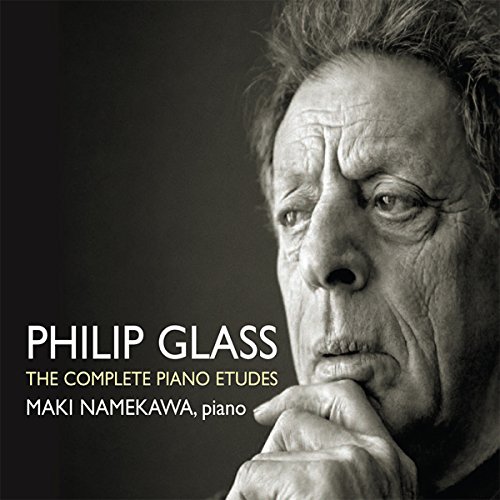GLASS The Complete Piano Etudes
View record and artist detailsRecord and Artist Details
Composer or Director: Philip Glass
Genre:
Instrumental
Label: Orange Mountain Music
Magazine Review Date: 02/2015
Media Format: CD or Download
Media Runtime: 124
Mastering:
DDD
Catalogue Number: OMM0098

Tracks:
| Composition | Artist Credit |
|---|---|
| 20 Etudes for Piano |
Philip Glass, Composer
Maki Namekawa, Piano Philip Glass, Composer |
Author: Pwyll ap Siôn
The Etudes are therefore closely linked to Glass both as composer and performer; indeed, he has described them as self-portraits of sorts. However, there is little doubt that Maki Namekawa’s superlative performances on this recording transport these pieces to an entirely new plane. Etude 2, which may be familiar to some readers in its arrangement for two violins and string orchestra called Echorus (the Etude came first, in fact), is a case in point. Despite being uneven and at times alarmingly imprecise, Glass’s own recording shows plenty of weight and character, while Dennis Russell Davies’s performance from the 2008 Ruhr Piano Festival seems restrained and detached. Namekawa manages to balance both passion and precision, shaping the Etude’s oscillating patterns and resonant bass notes with sensitivity and control.
It’s an aspect of her playing which features throughout the set. Etude 6 is equally effective; Namekawa imbues its binary contrasts with dexterity, poise and power. During the 10th she sounds simultaneously motoric and melodic, and in the 11th uses the instrument’s full dynamic and colouristic potential. The Etudes of Book 2 are on the whole less virtuoso – Glass has described them as being ‘about the language of music itself’ – and there are times when the music lacks the subtlety and spontaneity of the opening set, becoming increasingly trapped by its harmonic sound world. However, the very final Etude, modelled on material taken from Glass’s music for Godfrey Reggio’s film Visitors, is a work of extraordinary power and beauty, at times quite unlike what one might expect from the composer. And with Namekawa at the piano, the set is worth buying for that Etude alone.
Explore the world’s largest classical music catalogue on Apple Music Classical.
Included with an Apple Music subscription. Download now.

Gramophone Digital Club
- Digital Edition
- Digital Archive
- Reviews Database
- Events & Offers
From £9.20 / month
Subscribe
Gramophone Club
- Print Edition
- Digital Edition
- Digital Archive
- Reviews Database
- Events & Offers
From £11.45 / month
Subscribe
If you are a library, university or other organisation that would be interested in an institutional subscription to Gramophone please click here for further information.






